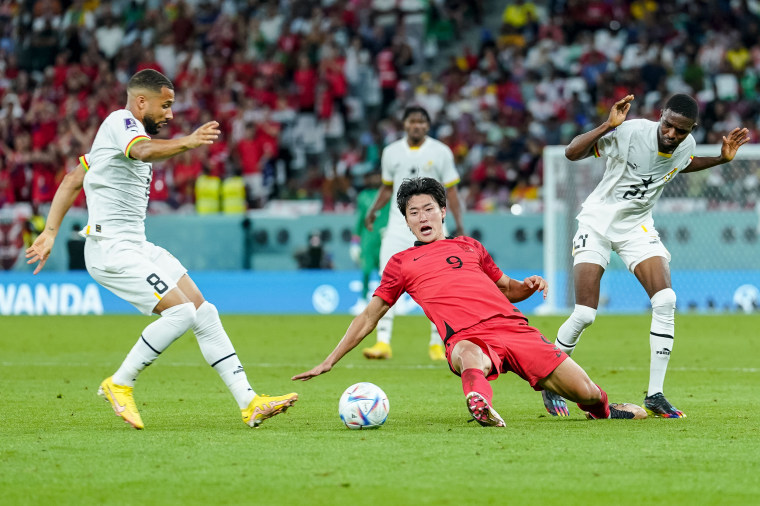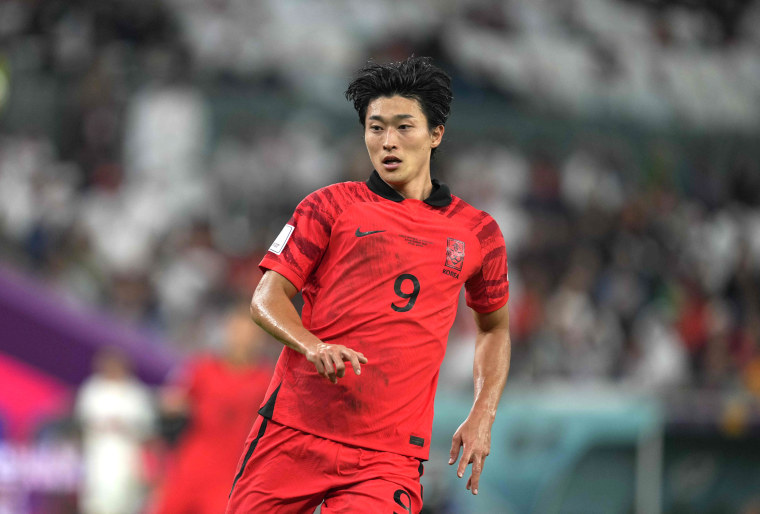South Korea’s World Cup run ended with a 4-1 loss to Brazil on Monday, but the team boasted some undisputable wins off the field: the minting of several heartthrobs.
Team captain Son Heung Min already enjoyed international acclaim as a forward for Tottenham Hotspur and can now add Calvin Klein underwear model to his resume along with Premier League top scorer. Teammates Jeong Seung Won, number 10, has been compared to K-pop stars, and Cho Yu Min has also attracted new fans of the sport.
But, according to the internet, no one’s star has shone brighter than that of Korea’s “player number 9,” striker Cho Gue-sung.
Cho, 24, was a local celebrity as a player for Jeonbuk Hyundai Motors FC before the World Cup, when he had 20,000 Instagram followers. Now, just weeks later, he has 2.6 million — having posted only six times.
And it’s not just his looks — fans also point to his vibe. Reports that Portugal’s Cristiano Ronaldo complained that Cho told him to hurry off the field when he was being subbed out only endeared him to fans, as did videos of him pushing back against opposing players.
Fan reactions to Cho have been documented across social media platforms in many languages, including Korean, English, Spanish, Portuguese and Arabic. On TikTok, videos related to “Cho Gue sung” have garnered 25.5 million views, while the hashtag of his name written in Korean, #조규성, has received 224.4 million.
Even Brazilian fans took note of the opposing team’s thirst trap for their first knockout round match. One Twitter user wrote in Portuguese: “I offer myself as a tribute to console Korea’s number 9 when Brazil beats it today (Brazil for the love of God).”
Cho’s popularity dovetails the global rise of popular culture from Korea, often referred to hallyu or the “Korean wave,” epitomized by K-pop groups such as BTS and Korean TV dramas such as “Squid Game” or “Extraordinary Attorney Woo.”
“It was only a matter of time until athletes gained the spotlight. Koreans have been making inroads into pop culture since the early 2000s, and now, because of dramas and films like “Parasite,” Seoul can compete with Hollywood,” said David Yi, author of “Pretty Boys.”
“This is significant in the Western world as Asian men have long been considered as undesirable and unattractive. In the latter part of the 1800s, Yellow Peril was a campaign orchestrated to make Asian men seem emasculated, and was so successful, the notion stuck around until recently. Social media and globalization has also further democratized who is deemed attractive and not,” Yi said.
Meghan McClain, a tech worker in San Francisco in her 30s, and a fan of Cho’s, noted that the fawning over Cho and other Asian men gaining global followings lately seemed different, suggesting that what’s defined as attractive for Asian men is expanding.
“Some of the Korean heartthrobs these days seem like a welcome addition to the extremely soft image of K-pop idols in that they’re trending more masculine,” she said.
Cho first generated buzz in his World Cup debut during Korea’s match against Uruguay, which ended in a scoreless tie. But the Nov. 28 match against Ghana, in which Cho headed the team’s two goals within minutes, catapulted him to fame as both talent and eye candy.
Many of the same tools used in bringing K-pop to global dominance have bolstered Cho’s rise in popularity, including an international fan base already well-versed in Korean culture.
Then there is, of course, the assist from social media.
After the Ghana match, a fan cam video of Cho simply sitting on a bench, staring into space, albeit while Being Handsome, garnered 6 million views. By Tuesday it reached 9 million.

“This is a typical way the K-pop world creates buzz,” wrote Hong Seok-kyeong, a professor of communications at Seoul National University, in an email.
“The world is so much smaller thanks to TikTok and Instagram. One can point to 2002’s World Cup heartthrob, Ahn Jung Hwan, whose beauty was only celebrated locally in South Korea. Twenty years later, the world’s eyes have opened to how beautiful, powerful, and desirable Koreans can be universally,” Yi said.
The Athletic published a story chronicling Cho’s struggles with his newfound fame. “His phone was going all night. It was keeping him awake. He was trying to concentrate on football and, all the time, the messages were coming,” according to South Korean reporter Seo Jung-hwan.
Jeff Yang, co-author of “RISE: A Pop History of Asian America from the 90s to Now,” shared in an email why he sees Cho’s rapid rise as progress.
“Just a few decades ago, I would have thought it impossible for an Asian man to be seen as the epitome of global male beauty, but here we are now in an era where K-pop rules the airwaves and the internet swoons over Asian and Asian American screen idols like Henry Golding and Harry Shum Jr.,” he said.
“In that sense the obsession over Cho is progress, because I’m sure that even with his sculpted cheekbones and chiseled abs, he’d have gone largely unnoticed when I was growing up. Visibility matters and representation matters — and beauty standards have finally caught up with the reality so many of us grew up with!” Yang said.
For Naomi Ko, 31, a Korean-American filmmaker from St. Paul, Minnesota, the entirety of the Cho package works. She watched the Koreans play Brazil with friends in L.A.’s Koreatown, with a group of fellow admirers.
“He’s hot, he knows it, and he scored two goals for Korea in the World Cup. What more could you want? He did us proud.”
Then she added what more a Cho fan could possibly want: “Update your insta.”
